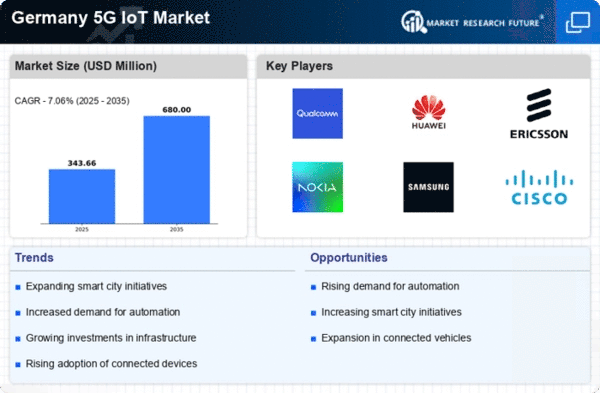Increased Focus on Energy Efficiency
Energy efficiency is becoming a critical concern in Germany, driving the growth of the 5G IoT Market. Businesses and consumers alike are seeking solutions to reduce energy consumption and minimize environmental impact. The integration of IoT devices with 5G technology enables real-time monitoring and management of energy usage, leading to smarter energy solutions. For instance, smart meters and connected appliances can optimize energy consumption patterns, potentially reducing costs by up to 20%. This focus on sustainability aligns with Germany's commitment to achieving its climate goals, further propelling the 5g iot market. As energy efficiency becomes a priority, the demand for innovative IoT solutions is likely to increase, fostering market expansion.
Advancements in Automotive Connectivity
The automotive sector in Germany is undergoing a transformation, with advancements in connectivity significantly influencing the 5G IoT Market. The rise of connected vehicles and autonomous driving technologies necessitates robust and reliable communication networks. 5G technology offers the low latency and high bandwidth required for real-time data exchange between vehicles and infrastructure. As a result, the automotive industry is projected to invest over €30 billion in connected vehicle technologies by 2027. This investment is expected to drive the adoption of IoT solutions, enhancing safety, efficiency, and user experience. The interplay between automotive innovation and the 5g iot market suggests a dynamic growth trajectory, as both sectors evolve in tandem.
Growing Interest in Smart Home Technologies
The trend towards smart home technologies is gaining momentum in Germany, significantly impacting the 5G IoT Market. Consumers are increasingly interested in IoT-enabled devices that enhance convenience, security, and energy management within their homes. The market for smart home devices is expected to reach €5 billion by 2026, driven by the proliferation of 5G networks that enable seamless connectivity. Smart thermostats, security cameras, and lighting systems are becoming commonplace, allowing homeowners to control their environments remotely. This growing interest indicates a shift in consumer behavior towards adopting advanced technologies, which is likely to further stimulate the 5g iot market. As smart home solutions become more integrated, the demand for reliable and fast connectivity will continue to rise.
Rising Demand for Smart Agriculture Solutions
The 5G IoT Market in Germany is experiencing a notable surge in demand for smart agriculture solutions. Farmers are increasingly adopting IoT devices to monitor crop health, soil conditions, and weather patterns in real-time. This trend is driven by the need for enhanced productivity and sustainability in agriculture. According to recent data, the agricultural sector in Germany is projected to grow by approximately 5.5% annually, with IoT applications playing a crucial role. The integration of 5G technology allows for faster data transmission and improved connectivity, enabling farmers to make informed decisions quickly. As a result, the 5g iot market is likely to expand significantly, providing innovative solutions that enhance operational efficiency and resource management in agriculture.
Government Initiatives Supporting Digital Transformation
The German government is actively promoting digital transformation across various sectors, which is significantly impacting the 5G IoT Market. Initiatives such as the Digital Strategy 2025 aim to enhance the country's digital infrastructure, including the rollout of 5G networks. This strategic focus is expected to facilitate the adoption of IoT technologies in industries such as manufacturing, logistics, and healthcare. With an investment of over €10 billion in digital infrastructure, the government is creating an environment conducive to innovation. Consequently, the 5g iot market is poised for growth as businesses leverage these advancements to improve efficiency and competitiveness. The alignment of public policy with technological advancements suggests a robust future for the 5g iot market in Germany.
















